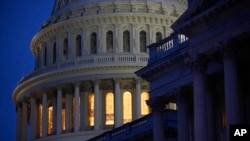Among the many reasons the United States Senate is called "the world's most deliberative body" is because of something called the filibuster that is often blamed for today's dysfunction in Washington.
"Legislation can't pass with just a simple majority," Norm Ornstein, emeritus scholar at the American Enterprise Institute, explained. "If a minority of the (senators) disagree, they can deny consent to move forward, and it then takes a higher bar to overcome this to close out the debate."
"They have what we call a supermajority cloture rule," said Sarah Binder, a senior fellow at the Brookings Institution. "And in today's Senate, that means in order for the majority to cut off debate and move to vote, you need 60 [of 100] senators to vote to cut off debate."
The high threshold to stop a filibuster and proceed to a vote was established so the minority party could help influence and craft legislation. Senators of both political parties have made ample use of the filibuster in recent years when in the minority.
In today's partisan political environment, Ornstein calls the filibuster "a weapon of mass obstruction" that frequently puts Congress at a stalemate on issue after issue, even when one party controls both chambers.
Filibuster roots
The filibuster has been around in some form since the mid-1800s, when senators used it to protect slavery. In the 1950s and 1960s, it was used to stall civil rights legislation.
In June 1963, Martin Luther King Jr. noted the filibuster of civil rights legislation as he reacted to the murder of fellow civil rights leader Medgar Evers and discussed the need for a march on Washington. A year later, the landmark Civil Rights Act of 1964 was passed.
"When people who supported segregation would filibuster civil rights and voting rights bills, they would have to sleep on cots outside the Senate floor because there could be a vote at any time," Ornstein recalled.
That was when the minority had to carry out what is called a "talking filibuster."
"The idea is to say to the opposition, 'OK, if you care so much about this bill, hold the floor, offer debate, offer proposals, offer amendments. Do the obstructive motions, what have you. Put your money where your mouth is.' Really, really show up," Binder said.
She said the inconvenience led to a change in the Senate rules.
No need to show to vote no
Binder, who is also a political science professor at The George Washington University, said frequent use of the filibuster caused senators to demand "some sort of coherence and some sort of scheduling certainty" about when votes would take place.
In 1975, the Senate changed the filibuster rules. Instead of needing two-thirds of senators present to vote to end debate, the new rule required three-fifths of the entire Senate. Hence, the need for 60 votes to end debate.
"Sounds like you're actually reducing the barrier to move to a vote, but they in fact increased it," Ornstein said. "If you need two-thirds of those present and voting, then the minority that's trying to block the action has to show up continuously on a regular basis. Because if they don't, the hurdle to overcome this filibuster and move to a vote is lower," he explained.
"But if you make it the entire Senate, then the burden is on the majority, and their senators are the ones who have to show up. So, there's no need for the minority to be on the floor at all or to do anything other than to say, 'We're going to filibuster,'" said Ornstein.
Manchin in the middle
When the filibuster rules changed in 1975, Joe Biden was in his second of 36 years in the Senate. During the 2020 presidential campaign, when he was asked about changing the filibuster rules, he often said it was the Senate's decision to make.
When asked last week whether he will have to choose between preserving the filibuster and advancing his agenda, Biden said, "Yes, but … you don't have to eliminate the filibuster. You have to do what it used to be back in the old days … stand up and command the floor. … You got to work for the filibuster."
That matches the position of Senator Joe Manchin from West Virginia. He is considered the most conservative of the Senate Democrats and the party's crucial 50th vote that allows Vice President Kamala Harris to cast any tie-breaking vote for Democrats.
"He is willing to take on positions that are more moderate, that are distinct from most Democrats in Congress," noted Jason MacDonald, political science professor at West Virginia University. "At the same time, he has expressed Democratic, and in some cases, liberal sensibilities about using the government to help people."
Manchin insists he will never vote to eliminate the filibuster because the Senate was meant to be a place for partisanship to "cool down and come together."
But he did allow for a revival of the talking filibuster to, in his words, "make it a little bit more painful."
Democrats changed the filibuster rules in 2013, lowering the threshold for executive branch nominees and federal judges. In 2017, Republicans responded by doing the same for Supreme Court nominees.
Senate Minority Leader Mitch McConnell warned Democrats they would rue any further changes.
"As soon as the Republicans wound up back in the saddle, we wouldn't just erase every liberal change that hurt the country, we'd strengthen America with all kinds of conservative policies, with zero input from the other side."
Biden-backed legislation on immigration reform and voting rights will soon test whether today's filibuster survives.







